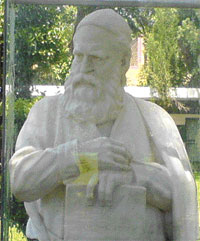[Tie world of Arts]
Celebrating the sonnets and Rubaiyat
The Dark Lady and the handsome nobleman who appear in Shakespeare's
sonnets still remain a mystery. No literary historian or scholar has
been able to crack down upon them. It baffled me when I read Shakespeare
for my examinations and I was not impressed by his sonnets or in their
mysteries. My teacher said I had an attitude towards them.
To begin with, why did Shakespeare had to write them still remain a
mystery to me. But then.... his sonnets are really spellbinding, full of
charm and languor. There is string and wind music in them that is
different to prose and poetry. These fourteen-line sonnets are typical
of Shakespeare's character and reveal his inner sensitive adoration
unknown to all of us. Perhaps whatever he failed to convey through his
plays, he packed them all into his sonnets. When I read them over and
over again, various thoughts cross my mind. Very often the Dark Lady
symbolizes the woman that Omar Khayyam celebrates in the Ruba'iayat.
'Look, the morning breeze has torn the rose's dress;
The nightingale is in ecstasy at the rose's beauty.
Sit in the rose's shade, for many such
Have come from earth and to it returned'.
(Verse 60)
Here, Khayyam's reference to the rose can imply a woman or a flower
while Shakespeare define the Dark Lady either to the Earl of Southampton
or a mysterious woman.
I am of opinion it was the Earl because of the Bard's infatuation for
the young man. It could not have been a comparison to Anne Hathaway as
we all know that he was least involved with his wife or her beauty. We
have never discovered a communication or for that matter a relationship,
a bondage or any romance between Shakespeare and Anne. She was not dark
or mysterious.
'Or I shall live your epitaph to make,
Or you will survive when I in earth am rotten;
|

Omar Khayyam |
From hence your memory death cannot take,
Although in me each part will be forgotten
Your name from hence immortal shall have
Thought, I once gone, to all the world must die'...
Sonnet - LXXX1
Very early in life, Khayyam's observation made him realise threat
unless stanzas delivered in power-words and tone to celebrate triumphant
occasions such as impressive concepts, could distract the vocabulary. He
struggled to come into terms in contemporary poems while being very
colloquial, was too risky an option. The wide span of poetry he embarked
upon was a cross between his thoughts ranging from truth to falacy. This
was what made him different from Shakespeare who had words and concepts
at his command like the spirit of movement in Kats Endymian. But
Khayyams' sketches of the seasons and their glory gripped him. Many a
time, he used the language of a painter seeped in the spirit of
movement. Omar Khayyam was a dreamer who rose from many forms of
intellectuality.
William Shakespeare was never an intellect in any given subject.
People found it difficult to understand his early English. Words were
spelt wrong. On many sentences, he paused and found it hard to complete.
But, then rose the colossus in him. He leapt to spectacular heights.
He made English his domain. He made it his style of language and set a
vocabulary for speech and drama. From great plays, he moved over to
poetry, prose and sonnets and created an English dictionary.
Shakespeare was never a dreamer like Khayyam nor a Romantic but like
a Lotus springing out of mud, he made his secondary education in to a
spectacular and sensational English dictionary that left half a dozen
University 'wits' who were his contemporaries at writing, amazed and
stunned. The poet they jeered and humiliated, was a threat to their
intellectuality.
In writing sonnets, Shakespeare denied himself of such appeal and to
its ideal values and abstractions. Most of his addresses were flawed and
inconsistent and the sequences gained depth and complexity precisely
because it remained anchored in the human world.
That is why I keep asking myself why Shakespeare had to write
sonnets?
He got himself into a situation he found difficult to avoid.
Therefore, he misled all of us by introducing the Dark Lady.
Was she man or woman? or neither; The situation was not simple to the
extent that there was a kind of story.
A split-image? One would argue so based on sonnets No. 40-42 while
Shakespeare comes down hard in sonnet No. 144.
'Two loves I have, of comfort and despair
Which like two spirits do suggest me still;
The better angel is a man right fair
The worse spirit a woman coloured ill
To win me soon to hell, my female evil
Tempteth my better angel from my side..
'The better angel' no doubt is the Earl Southapton for whom
Shakespeare had a platonic love and the dark one could be Anne Hathaway
who stood in the way. I may be right or wrong but there goes a scuffle
between two mysterious characters and the Bard caught in the centre.
Otherwise, it was all in his mind. The sequence seemed capable of
indefinite expansion, piling one sonnet after another and the Bard was
ironically aware that he was saying the same thing over and over again
so unlike Khayyam.
'My mistress' eyes are nothing like the sun;
Coral is far more red than he lips' red
If snow be white, why then her breast are dun
If hairs be wires, black wires grow on her head'
Sonnet 130
Presumed to be the Dark Lady of the sonnets, Shakespeare's dashing
young friend, Earl of Southamton whom he celebrated in his sonnets. |



